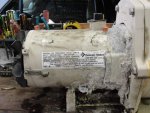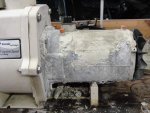Hi All,
I just replaced my 5 1/2 year old Intelliflo pump motor due to excessive noise, probably a bearing.
The original motor exhibits what I feel is a lot of corrosion (see pictures).
My pool guy tells me that this is a common problem with Intelliflo motors that they often corrode like this after a few years.
I would like to know what others have experienced with these motors.


I just replaced my 5 1/2 year old Intelliflo pump motor due to excessive noise, probably a bearing.
The original motor exhibits what I feel is a lot of corrosion (see pictures).
My pool guy tells me that this is a common problem with Intelliflo motors that they often corrode like this after a few years.
I would like to know what others have experienced with these motors.





